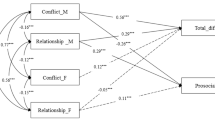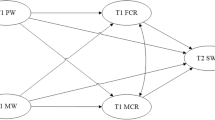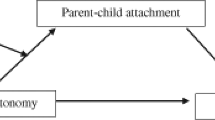Abstract
This longitudinal study examined associations between parents’ unequal division of child care when children were 5 years of age and children’s self-regulation difficulties 2 years later, and whether parents’ mental health problems, marital conflict, and warmth toward children mediated this association. Participants were 1707 families drawn from the Panel Study on Korean Children. Mothers and fathers reported on their perceptions of inequality in the division of child care, mental health, marital conflict, and parental warmth. Mothers and teachers reported on children’s self-regulation difficulties. Parental division of child care was unequal with mothers shouldering the majority of it. Mothers’ perceptions of inequality in the division of child care was positively associated with maternal and paternal mental health problems and with their own and their spouses’ reports of marital conflict. Fathers’ perceptions of inequality in the division of child care was positively associated with paternal warmth. Results of an actor-partner interdependence mediation model showed significant indirect effects from mothers’ perceptions of inequality in the division of child care to children’s self-regulation difficulties via mothers’ reports of marital conflict and maternal warmth. Additionally, there was an indirect effect from fathers’ perceptions of inequality in the division of child care to children’s self-regulation difficulties via paternal warmth. The findings highlight the importance of the equal division of child care between parents in family functioning and children’s development.
Highlights
-
Mothers’ perceptions of inequality in the division of child care were positively associated with both parents’ mental health problems and both parents’ reports of marital conflict.
-
Fathers’ perceptions of inequality in the division of child care positively predicted their warmth toward their children.
-
Maternal perceptions of marital conflict and maternal warmth mediated the link between mothers’ perceptions of inequality in the division of child care and children’s self-regulation difficulties.
-
Paternal warmth mediated the link between fathers’ perceptions of inequality in the division of child care and children’s self-regulation difficulties.


Similar content being viewed by others
References
Blair, C., & Razza, R. P. (2007). Relating effortful control, executive function, and false belief understanding to emerging math and literacy ability in kindergarten. Child Development, 78(2), 647–663. https://doi.org/10.1111/j.1467-8624.2007.01019.x.
Bollen, K. A., & Stine, R. (1990). Direct and indirect effects: classical and bootstrap estimates of variability. Sociological Methodology, 20, 115–140. https://doi.org/10.2307/271084.
Bridgett, D. J., Burt, N. M., Edwards, E. S., & Deater-Deckard, K. (2015). Intergenerational transmission of self-regulation: A multidisciplinary review and integrative conceptual framework. Psychological Bulletin, 141(3), 602–654. https://doi.org/10.1037/a0038662.
Bulanda, R. E. (2004). Paternal involvement with children: the influence of gender ideologies. Journal of Marriage and Family, 66(1), 40–45. https://doi.org/10.1111/j.0022-2455.2004.00003.x.
Cameron Ponitz, C. E., McClelland, M. M., Jewkes, A. M., Connor, C. M., Farris, C. L., & Morrison, F. J. (2008). Touch your toes! Developing a direct measure of behavioral regulation in early childhood. Early Childhood Research Quarterly, 23(2), 141–158. https://doi.org/10.1016/j.ecresq.2007.01.004.
Carlson, D. L., Hanson, S., & Fitzroy, A. (2016). The division of child care, sexual intimacy, and relationship quality in couples. Gender & Society, 30(3), 442–466. https://doi.org/10.1177/0891243215626709.
Chan, R. W., Brooks, R. C., Raboy, B., & Patterson, C. J. (1998). Division of labor among lesbian and heterosexual parents: Associations with children’s adjustment. Journal of Family Psychology, 12(3), 402–419. https://doi.org/10.1037/0893-3200.12.3.402.
Cho, B. H., Lee, J. S., Lee, H. S., & Kwon, H. K. (1999). 한국 부모의 자녀 양육방식에서의 차원과 평가 [Dimensions of assessment of Korean parenting style]. Family and Environment Research, 37, 123–133.
Choe, D. E., Olson, S. L., & Sameroff, A. J. (2013). Effects of early maternal distress and parenting on the development of children’s self-regulation and externalizing behavior. Development and Psychopathology, 2, 437–453.
Claffey, S. T., & Mickelson, K. D. (2009). Division of household labor and distress: the role of perceived fairness for employed mothers. Sex Roles, 60, 819–831. https://doi.org/10.1007/s11199-008-9578-0.
Coltrane, S. (2000). Research on household labor: Modeling and measuring the social embeddedness of routine family work. Journal of Marriage and Family, 62(4), 1208–1233. https://doi.org/10.1111/j.1741-3737.2000.01208.x.
Conger, R. D., Ge, X., Elder, Jr, G. H., Lorenz, F. O., & Simons, R. L. (1994). Economic stress, coercive family process, and developmental problems of adolescents. Child Development, 65(2), 541–561. https://doi.org/10.1111/j.1467-8624.1994.tb00768.x.
Cowan, P. A., Cowan, C. P., & Kerig, P. K. (1993). Mothers, fathers, sons, and daughters: Gender differences in family formation and parenting style. In P. A. Cowan, D. Field, D. Field, D. Hansen, A. Skolnick & G. Swanson (Eds.), Family. self, and society: Toward a new agenda for family research (pp. 165–195). Erlbaum.
Craig, L., & Mullan, K. (2011). How mothers and fathers share childcare: a cross-national time-use comparison. American Sociological Review, 76(6), 834–861. https://doi.org/10.1177/0003122411427673.
Cummings, E. M., Goeke-Morey, M. C., & Raymond, J. (2004). Fathers in family context: Effects of marital quality and marital conflict. In M. E. Lamb (Ed.), The role of the father in child development (pp. 196–221). Wiley.
Cummings, E. M., Keller, P. S., & Davies, P. T. (2005). Towards a family process model of maternal and paternal depressive symptoms: Exploring multiple relations with child and family functioning. Journal of Child Psychology and Psychiatry, 46(5), 479–489. https://doi.org/10.1111/j.1469-7610.2004.00368.x.
Dawson, G., Ashman, S. B., Panagiotides, H., Hessl, D., Self, J., Yamada, E., & Embry, L. (2003). Preschool outcomes of children of depressed mothers: Role of maternal behavior, contextual risk, and children’s brain activity. Child Development, 74(4), 1158–1175. https://doi.org/10.1111/1467-8624.00599.
DeMaris, A., & Mahoney, A. (2017). Equity dynamics in the perceived fairness of infant care. Journal of Marriage and Family, 79(1), 261–276. https://doi.org/10.1111/jomf.12331.
Dix, T., & Meunier, L. N. (2009). Depressive symptoms and parenting competence: an analysis of 13 regulatory processes. Developmental Review, 29(1), 45–68. https://doi.org/10.1016/j.dr.2008.11.002.
Ehrenberg, M. F., Gearing-Small, M., Hunter, M. A., & Small, B. J. (2001). Childcare task division and shared parenting attitudes in dual-earner families with young children. Family Relations, 50(2), 143–153. https://doi.org/10.1111/j.1741-3729.2001.00143.x.
Farr, R. H., & Patterson, C. J. (2013). Coparenting among lesbian, gay, and heterosexual couples: associations with adopted children’s outcomes. Child Development, 84(4), 1226–1240. https://doi.org/10.1111/cdev.12046.
Fincham, F. D., & Bradbury, T. N. (1993). Marital satisfaction, depression, and attributions: a longitudinal analysis. Journal of Personality and Social Psychology, 64(3), 442–452. https://doi.org/10.1037/0022-3514.64.3.442.
Fosco, G. M., & Grych, J. H. (2013). Capturing the family context of emotion regulation: a family systems model comparison approach. Journal of Family Issues, 34(4), 557–578. https://doi.org/10.1177/0192513X12445889.
Furukawa, T. A., Kessler, R. C., Slade, T., & Andrews, G. (2003). The performance of the K6 and K10 screening scales for psychological distress in the Australian National Survey of Mental Health and Well-being. Psychological Medicine, 33(2), 375–362. https://doi.org/10.1017/S0033291702006700.
Galovan, A. M., Holmes, E. K., Schramm, D. G., & Lee, T. R. (2014). Father involvement, father–child relationship quality, and satisfaction with family work: Actor and partner influences on marital quality. Journal of Family Issues, 35(13), 1846–1867. https://doi.org/10.1177/0192513X13479948.
Glysch, R.L., & Vandell, D.L. (1992). Associations between family of origin relationships and parental involvement with onemonth old infants. Tempe, AZ: Paper presented at the meeting of the Southwestern Society for Research in Human Development.
Grote, N. K., Clark, M. S., & Moore, A. (2004). Perceptions of injustice in family work: the role of psychological distress. Journal of Family Psychology, 18(3), 480–492. https://doi.org/10.1037/0893-3200.18.3.480.
Harold, G. T., Shelton, K. H., Goeke-Morey, M. C., & Cummings, E. M. (2004). Marital conflict, child emotional security about family relationships and child adjustment. Social Development, 13(3), 350–376. https://doi.org/10.1111/j.1467-9507.2004.00272.x.
Hoffman, C., Crnic, K. A., & Baker, J. K. (2006). Maternal depression and parenting: implications for children’s emergent emotion regulation and behavioral functioning, parenting. Parenting: Science and Practice, 6(4), 271–295. https://doi.org/10.1207/s15327922par0604_1.
Hong, S. (2014) 남성의 가족생활 참여 [Paternal involvement in family activities] Statistics Korea. http://kostat.go.kr/sri/srikor/srikor_pbl/3/index.board?bSeq=&pageNo=21&rowNum=10&amSeq=&sTarget=&sTxt=.
Hu, L., & Bentler, P. M. (1999). Cutoff criteria for fit indexes in covariance structure analysis: conventional criteria versus new alternatives. Structural Equation Modeling: A Multidisciplinary Journal, 6(1), 1–55. https://doi.org/10.1080/10705519909540118.
Jacobs, J. N., & Kelley, M. L. (2006). Predictors of paternal involvement in childcare in dual-earner families with young children. Fathering: A Journal of Theory, Research, and Practice about Men as Fathers, 4(1), 23–47. https://doi.org/10.3149/fth.0401.23.
Jin, M. K., Jacobvitz, D., Hazen, N., & Jung, S. H. (2012). Maternal sensitivity and infant attachment security in Korea: crosscultural validation of the Strange Situation. Attachment & Human Development, 14(1), 33–44. https://doi.org/10.1080/14616734.2012.636656.
Jung, H., Kim, M., Yeo, Y., Jun, J., Kim, M., Woo, S., & Choi, J. (2017). 사회통합 실태 진단 및 대응 방안 연구(IV) 사회문제 와 사회 통합 [A study of social problem and social cohesion in Korea with policy recommendations]. Korean Institute for Health and Social Affair. http://repository.kihasa.re.kr/handle/201002/29510.
Kamp Dush, C. M., Yavorsky, J. E., & Schoppe-Sullivan, S. J. (2018). What are men doing while women perform extra unpaid labor? Leisure and specialization at the transitions to parenthood. Sex Roles, 78(11–12), 715–730. https://doi.org/10.1007/s11199-017-0841-0.
Keizer, R., & Schenk, N. (2012). Becoming a parent and relationship satisfaction: a longitudinal dyadic perspective. Journal of Marriage and Family, 74(4), 759–773. https://doi.org/10.1111/j.1741-3737.2012.00991.x.
Kessler, R. C., Andrews, G., Colpe, L. J., Hiripi, E., Mroczek, D. K., Normand, S. L., Walters, E. E., & Zaslavsky, A. M. (2002). Short screening scales to monitor population prevalences and trends in non-specific psychological distress. Psychological Medicine, 32(6), 959–976. https://doi.org/10.1017/S0033291702006074.
Kochanska, G., Murray, K. T., & Harlan, E. T. (2000). Effortful control in early childhood: Continuity and change, antecedents, and implications for social development. Developmental Psychology, 36(2), 220–232. https://doi.org/10.1037/0012-1649.36.2.220.
Kochanska, G., Coy, K. C., & Murray, K. T. (2001). The development of self-regulation in the first four years of life. Child Development, 72(4), 1091–1111. https://doi.org/10.1111/1467-8624.00336.
Korean Institute of Child Care and Education (2016). Panel Study on Korean Children [PSKC] [Data set]. https://panel.kicce.re.kr/pskc/index.do.
Kouros, C. D., Papp, L. M., & Cummings, E. M. (2008). Interrelations and moderators of longitudinal links between marital satisfaction and depressive symptoms among couples in established relationships. Journal of Family Psychology, 22(5), 667–677. https://doi.org/10.1037/0893-3200.22.5.667.
Laible, D., Carlo, G., Panfile, T., & Augustine, M. (2014). Predicting children’s prosocial and cooperative behavior from their temperamental profiles: A person-centered approach. Social Development, 23(4), 734–752. https://doi.org/10.1111/sode.12072.
Ledermann, T., Macho, S., & Kenny, D. A. (2011). Assessing mediation in dyadic data using the actor-partner interdependence model. Structural Equation Modeling: A Multidisciplinary Journal, 18(4), 595–612. https://doi.org/10.1080/10705511.2011.607099.
Lee, S. J., Taylor, C. A., & Bellamy, J. L. (2012). Paternal depression and risk for child neglect in father-involved families of young children. Child Abuse & Neglect, 36(5), 461–469. https://doi.org/10.1016/j.chiabu.2012.04.002.
Leerkes, E. M., & Burney, R. V. (2007). The development of parenting efficacy among new mothers and fathers. Infancy, 12(1), 45–67. https://doi.org/10.1111/j.1532-7078.2007.tb00233.x.
Lively, K. J., Steelman, L. C., & Powell, B. (2010). Equity, emotion, and household division of labor response. Social Psychology Quarterly, 73(4), 358–379. https://doi.org/10.1177/0190272510389012.
Lucassen, N., Kok, R., Bakermans-Kranenburg, M. J., Van Ijzendoorn, M. H., Jaddoe, V. W. V., Hofman, A., Verhulst, F. C., Lambregtse-Van den Berg, M. P., & Tiemeier, H. (2015). Executive functions in early childhood: The role of maternal and paternal parenting practices. British Journal of Developmental Psychology, 33(4), 489–505. https://doi.org/10.1111/bjdp.12112.
Luthar, S. S., & Ciciolla, L. (2016). What it feels like to be a mother: variations by children’s developmental stages. Developmental Psychology, 52(1), 143–154. https://doi.org/10.1037/dev0000062.
Manian, N., Papadakis, A. A., Strauman, T. J., & Essex, M. J. (2006). The development of children’s ideal and ought self-guides: Parenting, temperament, and individual differences in guide strength. Journal of Personality, 74(6), 1619–1646. https://doi.org/10.1111/j.1467-6494.2006.00422.x.
Markman, H., Stanley, S., & Blumber, S. (1994). Fighting for your marriage. Jossey-Bass.
McBride, B. A., Brown, G. L., Bost, K. K., Shin, N., Vaughn, B., & Korth, B. (2005). Paternal identity, maternal gatekeeping, and father involvement. Family Relations, 54(3), 360–372. https://doi.org/10.1111/j.1741-3729.2005.00323.x.
McClelland, M. M., & Cameron, C. E. (2012). Self-regulation in early childhood: improving conceptual clarity and developing ecologically valid measures. Child Development Perspectives, 6, 136–142. https://doi.org/10.1111/j.1750-8606.2011.00191.x.
McCoy, K. P., George, M. R., Cummings, E. M., & Davies, P. T. (2013). Constructive and destructive marital conflict, parenting, and children’s school and social adjustment. Social Development, 22(4), 641–662. https://doi.org/10.1111/sode.12015.
McDaniel, B. T., Teti, D. M., & Feinberg, M. E. (2018). Predicting coparenting quality in daily life in mothers and fathers. Journal of Family Psychology, 32(7), 904–914. https://doi.org/10.1037/fam0000443.
McDonnell, C., Luke, N., & Short, S. E. (2019). Happy moms, happier dads: gendered caregiving and parents’ affect. Journal of Family Issues, 40(17), 2553–2581. https://doi.org/10.1177/0192513X19860179.
Milkie, M. A., Raley, S. B., & Bianchi, S. M. (2009). Taking on the Second Shift: Time Allocations and Time Pressures of U.S. Parents with Preschoolers. Social Forces, 88(2), 487–517. https://doi.org/10.1353/sof.0.0268.
Milkie, M. A., Bianchi, S. M., Mattingly, M. J., & Robinson, J. P. (2002). Gendered division of childrearing: ideals, realities, and the relationship to parental well-being. Sex Roles, 47(1–2), 21–38. https://doi.org/10.1023/A:1020627602889.
Mirowsky, J. (1985). Depression and marital power: an equity model. American Journal of Sociology, 91(3), 557–592. https://doi.org/10.1086/228314.
Morris, A. S., Silk, J. S., Steinberg, L., Myers, S. S., & Robinson, L. R. (2007). The role of the family context in the development of emotion regulation. Social Development, 16(2), 361–388. https://doi.org/10.1111/j.1467-9507.2007.00389.x.
Musick, K., Meier, A., & Flood, S. (2016). How parents fare: mothers’ and fathers’ subjective well-being in time with children. American Sociological Review, 81(5), 1069–1095. https://doi.org/10.1177/0003122416663917.
Muthén, L. K., & Muthén, B. O. (1998-2017). Mplus User’s Guide (8th ed.). Muthén & Muthén.
Neppl, T. K., Senia, J. M., & Donnellan, M. B. (2016). Effects of economic hardship: testing the family stress model over time. Journal of Family Psychology, 30(1), 12–21. https://doi.org/10.1037/fam0000168.
Nomaguchi, K. M., & Milkie, M. A. (2003). Costs and rewards of children: the effects of becoming a parent on adults’ lives. Journal of Marriage and Family, 65(2), 356–374. https://doi.org/10.1111/j.1741-3737.2003.00356.x.
Palermo, F., Ispa, J. M., Carlo, G., & Streit, C. (2018). Economic hardship during infancy and U.S. Latino preschoolers’ sociobehavioral health and academic readiness. Developmental Psychology, 54(5), 890–902. https://doi.org/10.1037/dev0000476.
Park, G. (2016). 기혼여성의 재량시간 활용과 시간관리 실태연구[Married women’s discretion time utilization and time management]. Seoul Foundation of Women and Family.
Pearlin, L. I. (1989). The sociological study of stress. Journal of Health and Social Behavior, 30(3), 241–256. https://doi.org/10.2307/2136956.
Ponnet, K., Wouters, E., Mortelmans, D., Pasteels, I., Backer, C. D., Leeuwen, K. V., & Hiel, A. V. (2013). The influence of mothers’ and fathers’ parenting stress and depressive symptoms on own and partner’s parent-child communication. Family Process, 52(2), 312–324. https://doi.org/10.1111/famp.12001.
Raley, S., Bianchi, S. M., & Wang, W. (2012). When do fathers care? Mothers’ economic contribution and fathers’ involvement in child care. American Journal of Sociology, 117(5), 1422–1459. https://doi.org/10.1086/663354.
Riina, E. M., & Feinberg, M. E. (2012). Involvement in childrearing and mothers’ and fathers’ adjustment. Family Relations, 61(5), 836–850. https://doi.org/10.1111/j.1741-3729.2012.00739.x.
Rueda, M. R., Posner, M. I., & Rothbart, M. K. (2005). The development of executive attention: contributions to the emergence of self-regulation. Developmental Neuropsychology, 28(2), 573–594. https://doi.org/10.1207/s15326942dn2802_2.
Schudlich, T. D. D. R., Shamir, H., & Cummings, E. M. (2004). Marital conflict, children’s representations of family relationships, and children’s dispositions towards peer conflict strategies. Social Development, 13(2), 171–192. https://doi.org/10.1111/j.1467-9507.2004.000262.x.
Silk, J. S., Shaw, D. S., Skuban, E. M., Oland, A. A., & Kovacas, M. (2006). Emotions regulation streategies in offspring of childhood-onset depressed mother. Journal of Child Psychology and Psychiatry, 47(1), 69–78. https://doi.org/10.1111/j.1469-7610.2005.01440.x.
Song, H.(2014a). 간편형 자기보고식 아동 청소년 집행기능 곤란 질문지 타당화 [Validity of child-adolescent self-reported executive function difficulty screening questionnaire]. Korean Journal of clinical psychology, 33(1), 121–137.
Song, H.(2014b). 간편형 자기보고식 아동 청소년 집행기능 곤란 질문지의 학교 적응에 대한 변별력 [Discriminant validity of child-adolescent self-reported executive function difficulty screening questionnaire on school adjustment].Journal of the Korean Association of Psychotherapy, 6(2), 39–48.
Statistics Korea. (2014). 한국인의 생활시간 변화상 [Changes in life time of Koreans]. https://kostat.go.kr/portal/korea/kor_nw/2/6/4/index.board?bmode=read&aSeq=346875.
Streit, C., Carlo, G., Ispa, J. M., & Palermo, F. (2017). Negative emotionality and discipline as long-term predictors of behavioral outcomes in African American and European American children. Developmental Psychology, 53(6), 1013–1026. https://doi.org/10.1037/dev0000306.
Sturge-Apple, M. L., Davies, P. T., & Cummings, E. M. (2006). Impact of hostility and withdrawal in interparental conflict on parental emotional unavailability and children’s adjustment difficulties. Child Development, 77(6), 1623–1641. https://doi.org/10.1111/j.1467-8624.2006.00963.x.
von Suchodoletz, A., Trommsdorff, G., & Heikamp, T. (2011). Linking maternal warmth and responsiveness to children’s selfregulation. Social Development, 20(3), 486–503. https://doi.org/10.1111/j.1467-9507.2010.00588.x.
Sullivan, O. (2013). What do we learn about gender by analyzing housework separately from child care? Some considerations from time-use evidence. Journal of Family Theory & Review, 5(2), 72–84. https://doi.org/10.1111/jftr.12007.
Yavorsky, J. E., Dush, C. M. K., & Schoppe-Sullivan, S. J. (2015). The production of inequality: the gender division of labor across the transition to parenthood. Journal of Marriage and Family, 77(3), 662–679. https://doi.org/10.1111/jomf.12189.
Author information
Authors and Affiliations
Corresponding author
Ethics declarations
Conflict of Interest
The authors declare no competing interests.
Ethical Approval
All procedures performed in this study were in accord with the ethical standards of the University of Missouri Institutional Review Board for research with human participants and with the 1964 Helsinki declaration and its later amendments. All participating families completed informed consent before participating.
Additional information
Publisher’s note Springer Nature remains neutral with regard to jurisdictional claims in published maps and institutional affiliations.
Rights and permissions
About this article
Cite this article
Im, J., Ispa, J.M. Unequal Division of Child Care between Korean Spouses and Children’s Self-Regulation: The Mediating Roles of Parental Mental Health, Marital Conflict, and Parental Warmth. J Child Fam Stud 31, 2491–2504 (2022). https://doi.org/10.1007/s10826-021-02147-3
Accepted:
Published:
Issue Date:
DOI: https://doi.org/10.1007/s10826-021-02147-3




